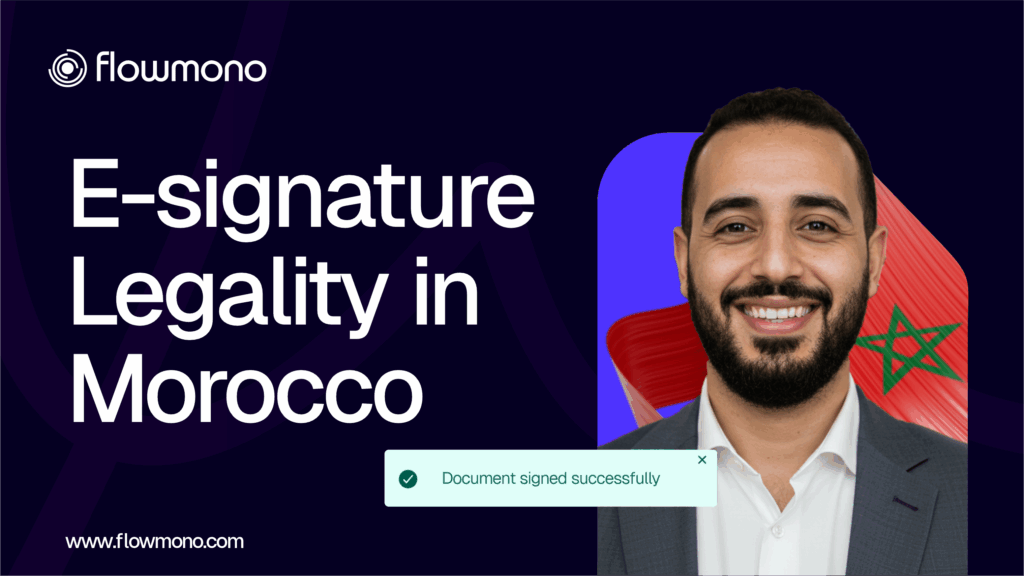
An electronic signature is any electronic data, process, or digital equivalent used to authenticate the origin of electronic data and to indicate agreement or approval. Its acceptance hinges on the principles of authenticity, integrity, and non-repudiation. Morocco’s appreciation of e-signatures is part of its broader strategy to promote digital transformation and improve business environments.
As Morocco accelerates its digital transformation agenda across sectors such as finance, justice, and public administration, the need for legally recognized and secure electronic signatures (e-signatures) has gained significant importance. Recognizing this, the Moroccan legal framework has evolved to ensure the validity and enforceability of e-signatures in electronic transactions. This article outlines the key laws governing e-signatures in Morocco, types of documents permitted and excluded from electronic signing, and recent legislative developments.
Legal Framework in Morocco
The primary legislation governing electronic signatures in Morocco includes:
- Law No. 53-05 on the Electronic Exchange of Legal Data (2007)
- Law No. 07-03, supplementing the Penal Code regarding Cybercrime
- Decree No. 2-08-518 (2008) implementing provisions for digital certification and e-signature infrastructure
Key Legal Principles:
1. Legal Recognition: Article 1 of Law No. 53-05 defines an electronic signature as data resulting from the use of a reliable identification process ensuring the signatory’s link to the signed act.
2. Admissibility: Article 417-1 of the Moroccan Civil Code, as amended, states that electronic documents and signatures have the same evidentiary value as handwritten signatures, provided that integrity and authentication are maintained.
3. Certification Authority (CA): The National Telecommunications Regulatory Agency (ANRT) is responsible for accrediting certification service providers (CSPs) who issue digital certificates used in qualified electronic signatures.
4. Qualified vs. Simple E-signatures: Only qualified electronic signatures, created using a secure device and digital certificate from a trusted CA, enjoy presumption of legal validity.
Documents That Can Be Signed Electronically
Moroccan law permits the use of e-signatures across numerous private and public sector use cases, especially where transactional efficiency and auditability are required. These include:
- Sales and commercial contracts
- Service-level agreements
- Employment contracts
- Bank account opening forms
- Loan agreements
- Government e-services, including tax declarations and procurement tenders
- Internal business approvals and HR policies
E-signatures are widely accepted by Morocco’s digital service providers, banks, and telecoms, especially in fintech and digital identity platforms.
Documents That Cannot Be Signed Electronically
Despite Morocco’s progressive legal stance on e-signatures, there are exceptions for certain types of documents due to public policy, evidentiary standards, or the need for notarization. These include:
- Wills and testamentary documents
- Marriage contracts
- Real estate transactions requiring notarization
- Notarial deeds
- Documents involving family law (divorce, child custody)
- Powers of attorney involving registration with courts or public entities
In these cases, a physical signature or notarized process is mandated by law.
Notable Legal Developments
a. Introduction of Law 53-05 (2007):
This landmark law established the legal equivalence of electronic and paper-based signatures, laying the foundation for digital commerce in Morocco.
b. Implementation of Decree No. 2-08-518:
This decree clarified the technical and procedural requirements for secure signature creation, digital certification, and the accreditation of trusted third-party providers.
c. National Certification Authority Framework:
The ANRT oversees and regulates CSPs, ensuring they meet minimum security and compliance standards. Notable CSPs include Barid eSign, a Moroccan electronic certification service launched by the Moroccan Post in 2011, that ensures the safety and integrity of electronic exchanges. It acts as a platform for secure electronic correspondence and exchanges, providing a reliable way to verify the identity of parties involved in digital transactions, and Maroc Telecommerce, the main telecommunications company in Morocco.
d. International Alignment:
Morocco’s legislation is largely influenced by the UNCITRAL Model Law on Electronic Signatures and EU eIDAS Regulation principles, ensuring interoperability and global recognition.
Adoption of E-signatures in Practice
Moroccan enterprises, particularly in banking and telecom sectors, use electronic signatures for account management, contract execution, and customer onboarding. Examples include:
- Attijariwafa Bank and BMCE Bank are offering digitally signed financial agreements
- Barid Bank and Poste Maroc are using e-signatures in digital postal services
- Government e-portals for tax, customs, and public procurement supporting authenticated digital signatures
Disclaimer
The information on this site is for general information purposes only and is not intended to serve as legal advice. Laws governing the subject matter may change quickly, so Flowmono cannot guarantee that all the information on this site is current or correct. Should you have specific legal questions about any of the information on this site, you should consult with a legal practitioner in your area.
Conclusion
Morocco has established a robust legal framework supporting the validity and enforceability of electronic signatures, making it easier for businesses and individuals to engage in secure digital transactions. While certain formal documents still require handwritten or notarized signatures, the general trend points to greater digitization and legal acceptance of electronic methods.
Companies seeking to adopt e-signatures in Morocco should work with certified providers and ensure compliance with the reliability, security, and identification standards set by Law 53-05 and its associated decrees.
References
- Law No. 53-05 on the Electronic Exchange of Legal Data, 2007
- Decree No. 2-08-518 on Digital Certification and Trusted Third Parties
- National Telecommunications Regulatory Agency (ANRT) – https://www.anrt.ma
- Barid eSign (Moroccan Certification Service Provider) – https://www.baridesign.ma
- UNCITRAL Model Law on Electronic Signatures, 2001
- Official Moroccan Government Legislation Portal – http://www.sgg.gov.ma
![]()